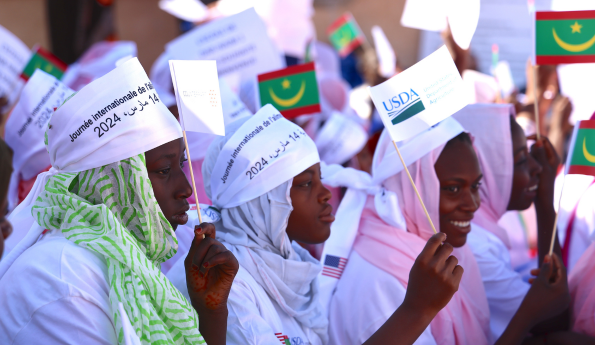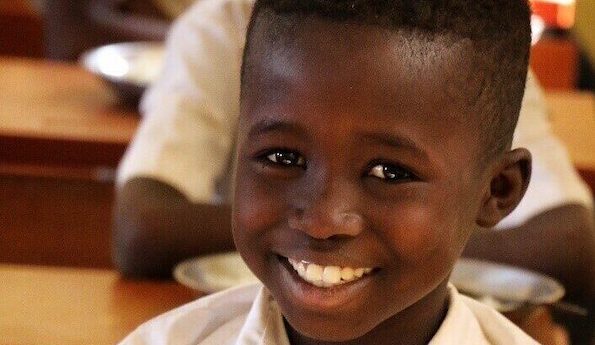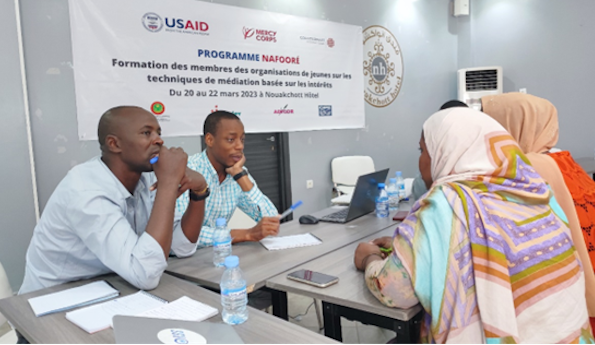This is part of a series of occasional dispatches by staff on issues related to our work.
Alette Gilje is a senior program officer for Resilient Food Systems at Counterpart, where she supports programming in Mauritania and commodity management across Counterpart’s portfolio. The opinions expressed in this blog are the author’s and do not express the views or opinions of Counterpart.
In the heart of Nouakchott, Djikké (the Pulaar and Soninke word for hope), a small urban credit and savings union, has blossomed into a national organization by expanding services to rural clients who lack access to basic financial services. As Mauritania’s economy grows and attracts international attention and private sector investment (such as the Grand Tortue Ahmeyin project), its businesses continue to innovate so that even the most remote communities have access to essential services such as formal financial systems. The journey of Djikké’s growth is a testament to the enduring impact of strategic partnerships Counterpart creates to facilitate locally led growth and lasting impact.

Djikké’s Nouakchott branch serves as the institution’s headquarters.
Djikke and Counterpart’s Beginnings
In October of 2006, Counterpart was awarded a USAID-funded Multi-Year Assistance Program in Mauritania called the Community Action, Nutrition and Livelihoods (CANAL) program.
CANAL sought a microfinance institution to extend microcredit services to the program’s target regions (Gorgol, Guidimaka, Assaba, and Hodh El Gharbi). At the time, Mauritania had limited experience with microfinance; only a handful of institutions offered microcredit services, and were peri-urban institutions, not present in the rural communities that Counterpart targeted in the south. Recognizing this gap in services, Counterpart found a partner in Caisse d’Epargne et de Crédit Djikké-Mutuelle (CECD-M or Djikké). Together we strengthened access to microfinance services in Mauritania during the life of the project. A decade later, Counterpart, currently implementing USAID and USDA programming in Mauritania, visited Djikké, who remained strong and committed to providing services in the same communities into which CANAL expanded Djikké.
Twenty years ago, Djikké promoted savings and credit to individual borrowers operating through four branch offices serving the urban and peri-urban areas of Nouakchott, Nouadhibou, and Rosso. During CANAL, Djikké delivered a total of 1,416 microloans worth $515,000. Loan recipients included 6,259 women and 394 associations and groups. 94% of borrowers have kept up on payments.
Counterpart worked with Djikké to strengthen their institutional capacity by introducing practices that bolstered their ability to evaluate potential credit customers, lowered the cash minimum to start a savings account, and used a derisking approach via grants to support loans to micro-enterprise and agricultural activities. This partnership allowed Djikké and Counterpart to design tailored loans for income generating activities such as grain mills, setting up shops, butcheries, bakeries and tie-dye centers to serve seven rural municipalities.

A Decade of Growth
Now, over 10 years since the end of the CANAL project in 2013, Djikké has added an additional nine branches to their business.
Access to finance is a critical tool to strengthening resilience in regions where people face poverty and shocks, such as the flooding in the 2022 monsoon season in Mauritania. Djikké has been a leader in creating an adaptable portfolio of creative financial services from checking, savings, and credit line accounts. Djikke is exploring a new frontier—digital banking solutions—to transform banking in a country where cash remains king. The country has only recently started adopting SMS and app-based banking solutions with the rise of Bankily, launched in November of 2020 during the COVID pandemic.
Today, Djikké has increased demand for loans from its clients and immense portfolio growth to keep up with Mauritania’s microcredit needs over the years since CANAL closed.

Djikké’s Selibaby, Guidimakha branch. Since the CANAL project ended a decade ago, Djikké has added nine new branches serving rural communities in Mauritania.
3 Strategies to Boost Access to Finance
Still, with all its success, Djikké faces challenges accessing sufficient capital. Djikké hits the all-too-common barrier when seeking additional capital from for-profit banks to meet the volume of client demand. Djikké encounters typical challenges faced by credit unions in developing countries, which impact its ability to grow efficiently. The institution struggles with insufficient working capital and cannot generate enough funds from deposits to meet the overall demand. Additionally, there is no structural mechanism in place for credit unions to borrow from bigger banks and access capital markets. This lack of access to additional capital exacerbates the situation. The high interest rates create an even more disabling environment, making it difficult to sustain and expand its services. All over the world this continues to be a consistent barrier to one of the most catalytic changes in people’s livelihoods—access to finance.
To address the critical access issues faced by institutions like Djikké, organizations like Counterpart can recommend 3 potential strategic interventions:
- Support partners such as Djikké to facilitate the establishment of partnerships with international development banks and donors. These alliances can secure essential capital to address client demands over the long term.
- Advocate for regulatory reforms to help credit unions access capital markets and lower interest rates that can foster growth.
- Support loan portfolio guarantees to banks, encouraging them to lend by reducing perceived risks. This strategy would enable the co-design of solutions funded by the respective country’s national budget, ensuring sustainable growth and resilience in local economies. Ultimately, this approach aims to create long-term solutions that do not require ongoing international interventions. (See US International Development Finance Corporation approach example)
15 years ago, Counterpart designed an intervention through the USAID-funded CANAL program to be delivered in financially underserved regions of Mauritania. It identified and partnered with Djikké, who was not in those regions but had the knowledge and infrastructure to branch out further. International funding opportunities like the CANAL project created the unique opportunity to fund the credit union’s expansion with less barriers to accessing the capital investment needed to expand. Counterpart gained insights into successful economic activities and growth areas and, in partnership with Djikke, provided loans for education, emergency funds, or healthcare.
A decade after the project officially closed, I walked into Djikke’s offices in Nouakchott. While some of the faces have changed, Djikke’s mission, honed by its work with Counterpart under CANAL, persists. Djikke continues to identify and meet community needs through financial support. While challenges remain, so does the resilience within underserved communities and as its name implies, Djikke continues the important work of fostering hope.






